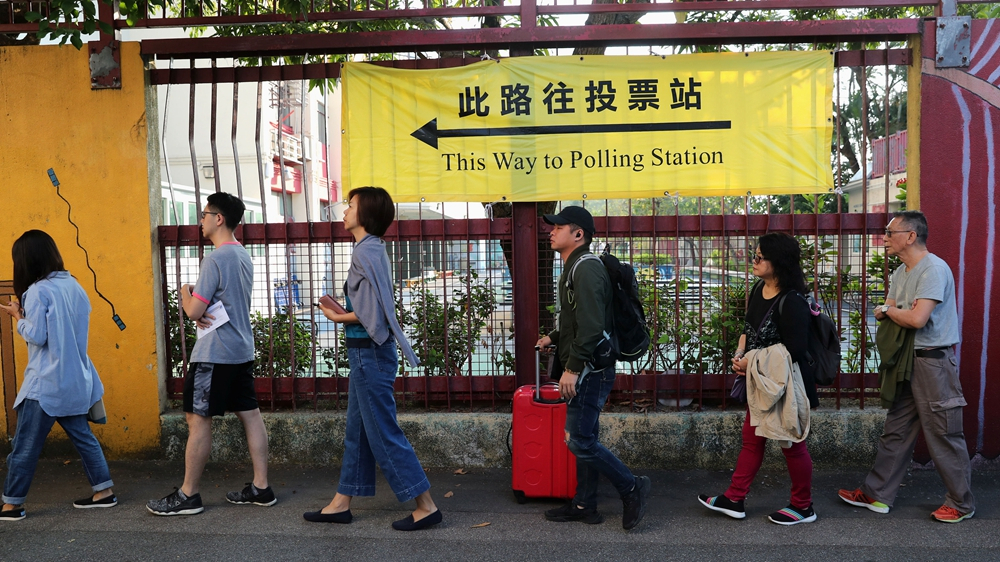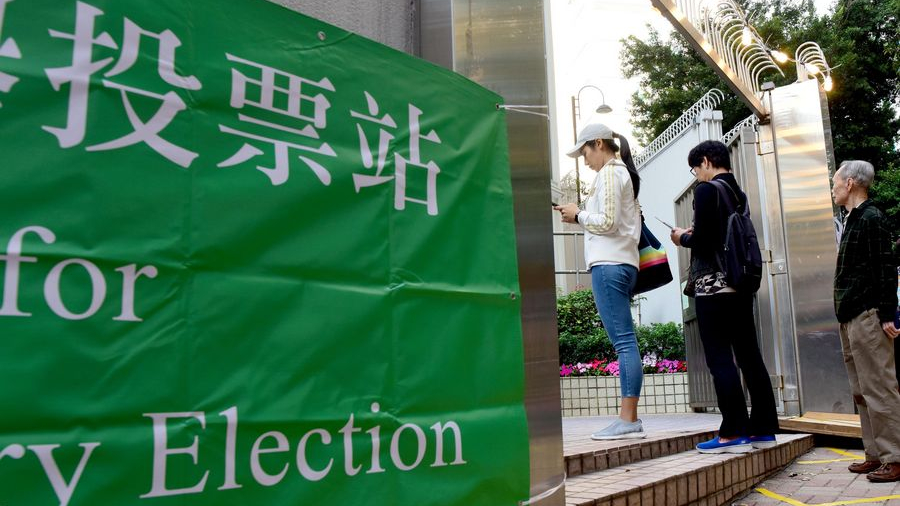
The election sees an unprecedented voter turnout in Hong Kong, China, November 24, 2019. /VCG Photo
The election sees an unprecedented voter turnout in Hong Kong, China, November 24, 2019. /VCG Photo
Editor's note: Ren Yi, a graduate from Harvard University's John F. Kennedy School of Government, is an influential Chinese blogger who has over a million followers on Weibo. The article reflects the author's opinions, and not necessarily the views of CGTN.
The district council elections of the Hong Kong Special Administrative Region (HKSAR) on November 24, 2019, were historic in that both the turnout and number of voters hit record highs. As we all know, the result was a resounding victory of the opposition over the establishment.
The core issue in the partisan politics in the HKSAR is its relations with the Chinese mainland. The question is how different camps can appeal to different socioeconomic and age groups, which have varying demands in relation to livelihood and well-being as well as positions on many issues. This leads to the creation of many political parties. For example, in the elections this year, over 30 parties or factions from the opposition as well as 12 from the establishment fielded candidates. It is rare for such a small city to have so many political groups anywhere in the world.
What is the single most important factor affecting the political stance of people in Hong Kong? The answer is age.
On one end, we have the youth, most of whom are radicals, nativists or self-determinists. They would vote for candidates from their own camps during elections. They are also the main force in protests, constituting the bulk of peaceful protesters and almost the entirety of radical protesters. Undoubtedly, many of them participated in the recent election as first-time voters.
On the other end is the older generation. For many reasons, such as education and age, older people in Hong Kong tend to side with the establishment. They also share other things in common.
The first one is high voter registration: over 70 percent among those aged 66-70 versus 45-50 percent among those aged 21-35. Consequently, a large portion of the registered voters in Hong Kong are elderly people: those aged over 60 account for about one third, while the age group of 18-35 only makes up one forth.
Secondly, the older generation also has higher turnout. For example, in the 2015 district council election, turnout of those aged 66-70 was 60 percent, while it was less than 40 percent for those aged 18-35. History has shown that the older a registered voter gets, the more likely he or she will come out to vote.
The establishment parties managed to retain a 40-percent support this time because Hong Kong is an aging society.
However, its defeat was obviously due to the strong mobilization of young people. With already a high turnout, there was not much to mobilize among the older generation, who might also fail to vote due to health reasons. It was a different story with the young people, who could be mobilized in large numbers.
In addition, judging by the candidates from the opposition and the establishment, it is clear that an increasing majority of young people are in the opposition camp, which continues to groom young successors and provide them with a path to the political arena. In contrast, most of the candidates from the establishment are middle-aged or older.
What will happen if this trend continues? As the older segment of the population retires from politics, Hong Kong will be taken over by these young people in the opposition.

People queue up to cast votes for the 2019 district council election of the HKSAR, China, November 24, 2019. /Xinhua Photo
People queue up to cast votes for the 2019 district council election of the HKSAR, China, November 24, 2019. /Xinhua Photo
Therefore, demographic change alone will deliver a hammer blow to the establishment. If anti-establishment becomes mainstream in a society due to generational shifts, some establishment parties may reverse their stance in order to win political support, out of fears that they may end up disconnected with the mainstream and become a party without electability.
This is the overall trend driving the politics in the HKSAR. It is essentially a demographic game.
Is the establishment not down to earth?
It is wrong to say that the establishment is disconnected from the people or not down to earth. In fact, the establishment appeals to both ends of the societal spectrum: the grassroots and the industrial/business elites. Traditional major parties, such as DAB and HKFTU, have embedded themselves in the grassroots over the years, providing community services, livelihood assistance and resources. Their base of support is the grassroots. Residents living in public housing tend to be the staunchest supporter of these parties.
However, the establishment fails to win over the middle class (mostly professionals and small-time intellectuals) and the young people in Hong Kong.
As the society becomes more politicized, it does not work by simply focusing on livelihood while avoiding political issues altogether. Basic livelihood services may be attractive to the grassroots, but not so much to the more affluent middle class, who tend to be attracted by abstract values and political identity. They believe the establishment is always pro-government and pro-Beijing, therefore lacks an independent political position.
As a result, the establishment is strong in economy but weak in politics. They are considered captured by the HKSAR government and Beijing, which in turn costs them the support from the middle class and alienates the youth.
This also shows that the HKSAR has a different population composition from regular societies. As a city dominated by services with a large middle class, it may be an M-shaped society. Such a middle class cannot be won over politically without shattering the superstructure built by the high bourgeoisie and international capitalists. An approach based on the lower middle class will not solve the problems in the HKSAR.
I respect your right to choose, though I may disagree
The opposition also scored a win in 2003. However, when they took office, it soon became clear that the only thing they were good at was chanting political slogans and blaming the government. They struggled to make any progress on many local affairs in the next four years.
In the ensuing elections, voters again voted for the establishment who could deliver for the people. After that, the establishment put in serious efforts to provide community services. The opposition still remembers this lesson. This time around, they might take this seriously after taking office and do their best to build the district councils into an important platform to engage in politics and accumulate base of support, with an aim to ultimately seize control of the Legislative Council and Chief Executive Election Committee.
The outcome of these elections may be hard to swallow for many people ethically, morally or politically. However, I respect the voters' right to choose.
(If you want to contribute and have specific expertise, please contact us at opinions@cgtn.com.)